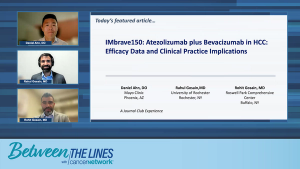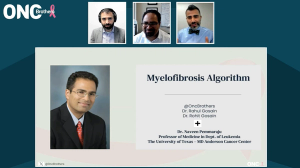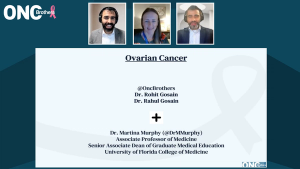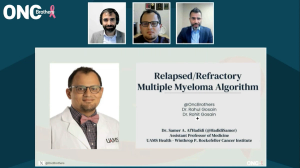Articles by Rohit Gosain, MD
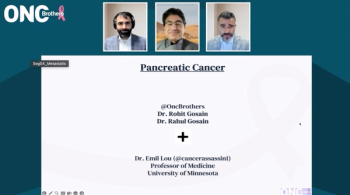
Panelists discuss how the frontline treatment of pancreatic cancer typically involves chemotherapy regimens such as FOLFIRINOX (leucovorin calcium, fluorouracil, irinotecan hydrochloride, and oxaliplatin) or gemcitabine-based therapies, with decisions guided by tumor characteristics, patient performance status, and treatment goals, aiming to improve survival outcomes and quality of life in newly diagnosed patients.

Panelists discuss how the treatment algorithm for metastatic pancreatic cancer involves a multidisciplinary approach, starting with chemotherapy regimens such as FOLFIRINOX (leucovorin calcium, fluorouracil, irinotecan hydrochloride, and oxaliplatin) or gemcitabine-based therapies and followed by considerations for targeted therapies, immunotherapy, and clinical trial participation, with the goal of managing symptoms, prolonging survival, and improving quality of life.

Panelists discuss how radiation therapy plays a crucial role in the treatment of pancreatic cancer, particularly in combination with surgery and chemotherapy, to manage locally advanced disease, reduce tumor size, and improve patient outcomes while also considering its potential adverse effects and optimal usage in treatment regimens.

Panelists discuss how next-generation sequencing (NGS) and germline testing are increasingly being used in pancreatic cancer to identify genetic mutations, guide personalized treatment decisions, and inform the use of targeted therapies, ultimately improving patient outcomes and advancing precision medicine.

Panelists discuss how the treatment approach for pancreatic cancer typically involves a multidisciplinary strategy that combines surgery, chemotherapy, radiation therapy, and emerging targeted therapies, with a focus on improving patient outcomes through individualized care plans based on tumor characteristics and disease stage.
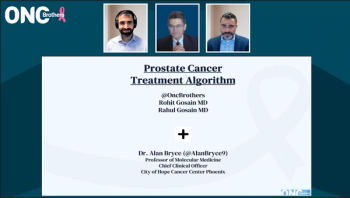
Experts discuss how to decide which robotic prostatectomy (RP) approach to utilize, considering factors such as patient characteristics, surgical outcomes, and the latest clinical evidence.

Experts discuss the role of PARP inhibitors in prostate cancer treatment, exploring their mechanisms, clinical benefits, and how they fit into current therapeutic strategies.

Experts discuss considerations for other androgen receptor inhibitors, highlighting their role in treatment strategies and how they impact patient outcomes in prostate cancer.

Experts give an overview of the treatment landscape in prostate cancer as of 2025.
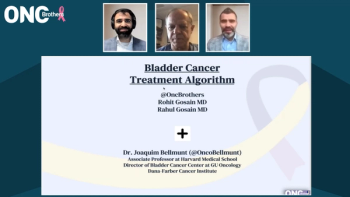
The Oncology Brothers, discuss how bladder cancer treatments commonly cause adverse effects, including frequent urination, painful urination, blood in urine, fatigue, nausea, hair loss, decreased immunity, diarrhea, skin irritation, and bladder inflammation. More severe effects may include organ damage, sexual dysfunction, and reduced fertility.

The Oncology Brothers, discuss how second-line treatment for bladder cancer typically involves immune checkpoint inhibitors (pembrolizumab, atezolizumab) after failure of platinum-based chemotherapy. For patients who are ineligible for immunotherapy, alternative chemotherapy regimens or targeted therapies may be used based on molecular profiling.

The Oncology Brothers, discuss how advances in bladder cancer management have demonstrated significant clinical benefits by strategically combining chemotherapy and immunotherapy, which leverages cytotoxic agents to directly target malignant cells while simultaneously activating immune-mediated tumor recognition, as well as checkpoint inhibitors that have shown promise in maintaining disease control after initial chemotherapy response, especially in metastatic settings.

The Oncology Brothers, discuss recent clinical trials for early muscle-invasive bladder cancer that have shown promising results with neoadjuvant chemotherapy followed by radical cystectomy as standard of care, immunotherapy trials using checkpoint inhibitors that have demonstrated improved pathological complete response rates, and bladder-sparing approaches combining maximal TURBT with chemoradiation that have shown comparable outcomes to cystectomy in select patients.

The Oncology Brothers, discuss how the definition of muscle-invasive bladder cancer is defined as when the cancer has invaded the muscle. They also highlight recommended treatment methods, including chemotherapy, immunotherapy, and aggressive surgery.
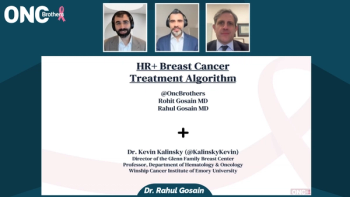
With Kevin Kalinsky, MD, the Oncology Brothers discuss sequencing treatment for endocrine-resistant diseases, which involves using a strategic approach to combat resistance to hormonal therapies. It includes combining therapies such as CDK4/6 inhibitors, mTOR inhibitors, and chemotherapy, aiming to overcome resistance and improve patient outcomes.

With Kevin Kalinsky, MD, the Oncology Brothers discuss metastatic breast cancer treatment, including hormone therapy, targeted therapy, chemotherapy, immunotherapy, and radiation. Options depend on cancer type, location, and patient health. The goal is to manage symptoms, slow progression, and improve quality of life.

With Kevin Kalinsky, MD, the Oncology Brothers discuss the treatment of locally advanced disease, which typically involves a multimodal approach, including surgery, radiation, and systemic therapies such as chemotherapy, immunotherapy, or targeted agents. The goal is to control tumor spread, reduce recurrence risk, and improve survival outcomes.

With Kevin Kalinsky, MD, the Oncology Brothers discuss hormone receptor–positive (HR+) breast cancer treatment, which targets HR+ tumors using hormone therapy (eg, tamoxifen, aromatase inhibitors), chemotherapy, targeted therapy (eg, CDK4/6 inhibitors), or sometimes surgery or radiation, depending on cancer stage and risk factors.
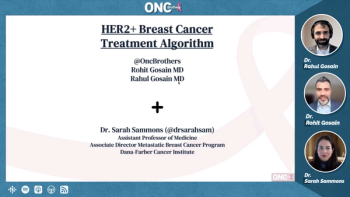
Panelists discuss how, data-free navigation of HER2+ breast cancer treatment requires careful consideration of established guidelines while accounting for individual patient factors. Treatment typically follows a multimodal approach, combining targeted HER2 therapies, chemotherapy, and surgery based on clinical expertise.

Panelists discuss how; the treatment of HER2-positive metastatic breast cancer typically involves HER2-targeted therapies combined with chemotherapy. First-line treatment usually consists of trastuzumab plus pertuzumab with a taxane. Subsequent lines may include T-DM1, tucatinib-based combinations, or other HER2-directed therapies, with treatment selection guided by disease characteristics and prior therapy response.

Panelists discuss how, TDM-1 (Trastuzumab emtansine/Kadcyla) is an antibody-drug conjugate used in HER2-positive breast cancer treatment. This targeted therapy combines Herceptin's cancer-cell targeting ability with a potent chemotherapy drug, delivering treatment directly to cancer cells while minimizing damage to healthy tissue.

Panelists discuss how, locally advanced HER2-positive breast cancer is characterized by overexpression of HER2 proteins with regional spread beyond the primary tumor, involving either extensive lymph node involvement, chest wall, or skin, but without distant metastases. Treatment typically combines targeted HER2 therapy, chemotherapy, and local interventions.

Panelists discuss how, for early-stage HER2-positive breast cancer, standard treatment typically combines surgery with targeted therapy (like trastuzumab/Herceptin), chemotherapy, and often radiation. This multi-modal approach, tailored to individual factors, has significantly improved survival rates for this aggressive subtype.
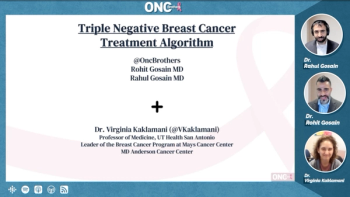
Panelists discuss how sacituzumab shows significant efficacy in triple-negative breast cancer, with improved progression-free and overall survival. It demonstrates particular benefit in pretreated patients and brain metastases cases. Trastuzumab deruxtecan (T-DXd) excels in HER2-positive breast cancer treatment, showing remarkable response rates and survival benefits, including in patients with brain metastases and those who progressed on prior therapies.

Panelists discuss how the approach to metastatic disease focuses on systemic therapy, as cancer has spread beyond its primary site. Treatment typically combines targeted therapy, immunotherapy, chemotherapy, and/or hormonal therapy based on cancer type and molecular profile. Goals shift toward extending survival, controlling symptoms, and maintaining quality of life rather than cure. Regular monitoring of treatment response and adverse effects guides ongoing care decisions.

Panelists discusses how triple-negative breast cancer (TNBC) treatment toxicities require careful monitoring and management. Common adverse effects include fatigue, nausea, hair loss, neuropathy from chemotherapy, and radiation-induced skin changes. Health care teams employ preventive strategies, dose modifications, and supportive care to minimize complications while maintaining treatment efficacy.

Panelists discuss how locally advanced triple-negative breast cancer (LATNBC) is an aggressive breast cancer subtype characterized by absence of estrogen receptor, progesterone receptor, and HER2 protein expression. It presents with large tumors and/or extensive lymph node involvement without distant metastasis. Treatment typically involves neoadjuvant chemotherapy followed by surgery and radiation.

Panelists discuss how triple-negative breast cancer (TNBC) is an aggressive form of breast cancer characterized by the absence of 3 key receptors: estrogen receptor, progesterone receptor, and HER2 protein. TNBC tends to grow and spread faster than other breast cancer types, presenting unique treatment challenges since common targeted therapies like hormone therapy and HER2-targeted treatments are ineffective. Standard treatment primarily relies on chemotherapy, surgery, and radiation.

Panelists discuss how thoracic oncologists are adapting to a rapidly evolving treatment landscape for lung cancer, focusing on the integration of novel therapies and the importance of biomarker-driven approaches in patient care.

Surgery followed by platinum-based chemotherapy may provide the most benefit for patients with ovarian cancer, according to a medical oncologist.










